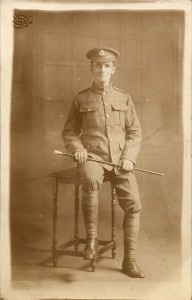Category: Military
Rank: Private
Regiment or Ship: 4/8th Battalion, 17th Middlesex Regiment; Army Service Corps.
Service Number(s): G/24767; T/392969
Occupation: Kitchen frame maker
Date of Birth: 12.04.1895
Place of Birth: Deal, Kent
Date of Death: 27.09.1965
Place of Death: General Hospital, Paddington, Middlesex.
Address: 55 Windsor Road, Bexhill
Photos and newspaper articles
Family Information
Parents: Frederick Smith Jones (1863-1954), born Ashford, and Agnes Alice Jones – nee Burton – (1871-1942), born in Godmersham.
Siblings:
Agnes Annie Jones, b. 1892 in Deal.
Frederick William Jones, b. 1894 in Deal.
Lilian Mary Jones, b. 1899 in Deal.
William Thomas Jones, b. 1902 in Deal.
Albert Ernest Jones, b. 1908 in Deal.
In 1911 Frederick and Agnes and their family lived at 40 Harbour Street, Ramsgate, and Frederick was a manager in a grocery business. However, when Charles enlisted in 1916 he gave his address as 55 Windsor Road, Bexhill on Sea, so we may assume that he was living in rented accommodation there – a Mrs Foster being resident there at that time, and her sons, Basil and Cecil, were also in the Forces.
Spouse: In 1920 Charles married Daisy Annie Bones (1891-1972) in Faversham, Kent.
First World War Experience
Charles enlisted on 29th February 1916. He was 20 years and 9 months old, single, and a British subject. His civilian occupation was as a kitchen frame maker and he gave his next-of-kin as being Frederick Jones, father, of Blythe Road, West Kensington. He was consigned to the Duke of Cambridge’s Own (Middlesex) Regiment and transferred to the Army Service Corps in 1918.
He served on English soil until 1st August 1916 when he was sent to France with the Expeditionary Forces and was finally demobbed on 18th November 1920.
Charles’ Theatre of War was France and he received both the British War Medal and the Victory Medal.
The following is a story from one of Charles’ family:-
“G/24767 & T/392989 PTE. CHARLES JONES – MIDDLESEX REGT. & ARMY SERVICE CORPS
Charles Jones joined the 4/8th Battalion of the Middlesex Regiment at the age of 21 in 1916. The 4/8th was later attached to the 17th Battalion and was sent to the Western Front. They were based in the Somme Sector, and in February 1917 Charles spent 3 days in water-logged trenches. He got Trench Foot, so his feet were heavily bandaged and he was sent back to England to recover. The bandages were removed and new dressings applied, easing the pain greatly. He was sent to convalesce at Leckhampton Court Red Cross Hospital near Cheltenham. While he was there, he took an album of photos. The photos are of fellow patients, some of the staff, and some of the grounds. He was at Leckhampton from 3rd March to 25th June 1917. The 4/8th and 17th Battalions were disbanded in February 1918, so it was probably at this time that Charles was transferred to the Army Service Corps. From family letters we know that he was able to stay in England for the remainder of the war.
On one occasion, he was on Cookhouse Duty with one of his pals. They were cooking a stew for the officers’ mess, and left it simmering while they went out to take a photograph. They were gone longer than they intended, and when they returned the stew was burnt. The other man told Charles not to worry, and began to add anything that he could find like tea, coffee and sauce. Charles then had to serve dinner, and took the stew nervously to the officers, leaving as quickly as he could. Later, even more nervously, he had to go to clear the tables, only to be congratulated on a fine stew, the best they had had in months!
While at the Front, our artillery opened up a barrage without warning the troops nearby. Had they done so, they would have been able to lie down or cover their ears and keep their mouths open. But Charles’ ears took the full shock and his eardrums were perforated. He was not invalided out and when demobilization came, like many others he signed papers quickly so as not to delay his freedom. However, in the late 1920’s he did try to claim damages, as his hearing worsened. But by then he had lost contact with all his comrades and, although he could quote day, time and place, he had nobody to corroborate his claim and got no recompense. His hearing gradually deteriorated until he was completely deaf.”


